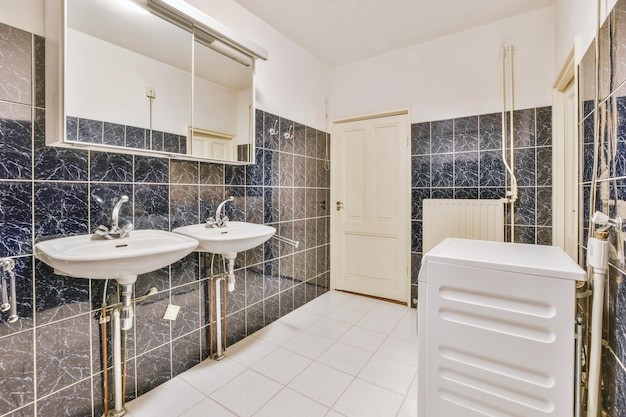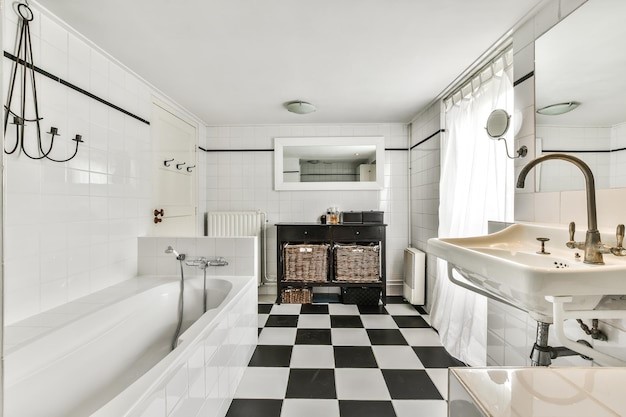Do you need a permit to renovate a bathroom? The short answer? Yes, you do. However, in several cases, permits aren’t required.
Whether or not you need a permit for bathroom renovation depends on your project’s scope for bathroom renovation. Simple renovations like painting, replacing faucets, updating light fixtures, and swapping out mirrors do not require permits, but most others do.
So, when do you really need a permit to renovate a bathroom? Here we’ve discussed some renovations where it become necessary.
When Do You Need a Permit to Renovate a Bathroom?
For most bathroom remodels, a permit becomes necessary when the work involves changes to the structure, plumbing, or electrical systems. But these renovations are too many to discuss all at once. Therefore, we have discussed below when you need a permit for bathroom renovation.
Plumbing Work
If your bathroom renovation involves moving or adding plumbing lines, you’ll need a plumbing permit. Examples include relocating a toilet, installing a new shower, or upgrading to a double sink. Permits and inspections are required to make sure the system meets local code and prevents leaks or drainage issues.
Even smaller changes, like replacing old pipes or adding new shut-off valves, may also require approval depending on local building regulations. Because plumbing mistakes can cause hidden water damage, inspectors ensure everything is installed correctly before the project is finalized.
Electrical Work
Almost any electrical work requires an electrical permit. This includes adding new outlets, rewiring circuits, installing heated floors, or upgrading bathroom lighting beyond a simple fixture replacement. A licensed contractor is typically required to handle this type of remodeling project, as incorrect wiring can be a major safety hazard.
Permits and inspections are in place to confirm that electrical work follows local code and does not increase fire risk. Without an electrical permit, you may also run into issues with insurance coverage if an accident occurs.
Structural Changes
Structural changes are one of the major components of a bathroom renovation. If you’re knocking down or building new walls, expanding the bathroom, or cutting into joists or beams, a building permit is necessary. Local building authorities need to confirm the remodeling project won’t compromise your home’s structural integrity.
These projects often require architectural review and may involve multiple inspections throughout the permitting process. Since structural mistakes can weaken your entire home, permits ensure the remodeling work is done safely and professionally.
HVAC Modifications
While replacing an HVAC component does not require a permit, the change in layout does. Adding, moving, or upgrading exhaust fans and HVAC vents usually requires a permit. To prevent mold and moisture damage, proper ventilation is necessary, which is why inspection is a part of the permitting process.
Major Fixture Replacements
While replacing a faucet doesn’t require a permit, bigger fixture changes do. Examples include converting a bathtub into a shower, installing a whirlpool tub, or replacing a shower pan. Adding a double vanity also adds separate plumbing lines, so it also counts as a major fixture replacement.
These projects typically involve plumbing and sometimes electrical work, so the professional renovator you hire in Georgia needs to have permits.
Waterproofing and Drainage Systems
So, do you need a permit to renovate a bathroom? Well, if your renovation involves waterproofing or drainage work, permits are required. Installing a new tile shower pan, adding waterproof membranes, or upgrading drainage systems directly affects how your bathroom handles water. Similarly, changing the drainage direction also counts as a structural change.
Improper installation leads to leaks and long-term damage, so these changes must follow local building codes and require inspections.
Cosmetic Upgrades – No Permits Needed
While most people know cosmetic changes do not require permits, there are some changes that people believe do. If you are changing the commode without affecting the pipes does not affect the structure. Therefore, it does not require permits.
Similarly, replacing the cabinetry without altering the wall has no impact on the overall bathroom structure. You are just basically changing the look of your bathroom.
In short, cosmetic upgrades, regardless of their size, only change your bathroom’s appearance and therefore don’t require permits.
🚿 Ready to Upgrade Your Bathroom?
Schedule your free consultation now, expert craftsmanship, on-time completion, and a space you’ll love!

So, Do You Need a Permit to Renovate a Bathroom?
At the end, whether you need permits or not depends on the scope of your bathroom renovation. Cosmetic upgrades like painting, swapping a faucet, or replacing mirrors are simple things that everyone can do, and hence do not require permits. But major renovations like electrical work and structural changes are complex upgrades that require expertise. Permits are necessary for such renovations, and you could fall into legal trouble without them.
More importantly, you should hire a renovation company that always ensures permits without you asking. The homeowner is ultimately responsible, regardless of DIY or contractual renovation. Therefore, always verify permits before the work starts, and hire a reputable home renovator in Georgia.
FAQs About Bathroom Renovation
When do you need a permit to renovate a bathroom?
Cosmetic upgrades like painting do not require permits. However, major upgrades do. Renovations that involve changes to the structure, plumbing, or electrical systems all require permits.
Do I need a licensed contractor to get bathroom remodeling permits?
In most cases, yes, you do. Many local building authorities require permits and inspections to be handled by a licensed contractor, especially for electrical work, plumbing, or structural changes. While homeowners can apply for permits themselves, hiring a professional ensures the remodeling project complies with local code.
What happens if I renovate a bathroom without permits?
You can get into legal trouble for that. Skipping the permitting process can lead to fines, stop-work orders, failed inspections, and even problems with insurance coverage. If you try to sell your home later, unpermitted remodeling work may also reduce its value or delay the sale.
How long does the permitting process take for bathroom remodels?
The timeline depends on your local building office. Minor bathroom remodels might get approved within a few days. Complex remodeling projects involving structural changes or extensive electrical work, however, may take several weeks. It’s best to plan permits in advance to avoid project delays.


